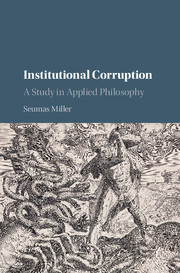Crossref Citations
This Book has been
cited by the following publications. This list is generated based on data provided by Crossref.
Santoro, Daniele
and
Kumar, Manohar
2018.
Speaking Truth to Power - A Theory of Whistleblowing.
Vol. 6,
Issue. ,
p.
123.
Ceva, Emanuela
and
Radoilska, Lubomira
2018.
Responsibility for Reason-Giving: The Case of Individual Tainted Reasoning in Systemic Corruption.
Ethical Theory and Moral Practice,
Vol. 21,
Issue. 4,
p.
789.
Thompson, Dennis F.
2018.
Theories of Institutional Corruption.
Annual Review of Political Science,
Vol. 21,
Issue. 1,
p.
495.
Thompson, Dennis F.
2019.
The International Encyclopedia of Ethics.
p.
1.
Brooks, Graham
2019.
Criminal Justice and Corruption.
p.
131.
Brooks, Graham
2019.
Criminal Justice and Corruption.
p.
83.
Brooks, Graham
2019.
Criminal Justice and Corruption.
p.
251.
Brooks, Graham
2019.
Criminal Justice and Corruption.
p.
57.
Brooks, Graham
2019.
Criminal Justice and Corruption.
p.
1.
O'Brien, Justin
2019.
Trust, Accountability and Purpose.
Miller, Seumas
2019.
The International Encyclopedia of Ethics.
p.
1.
Miller, Seumas
2020.
The Ethics of Cybersecurity.
Vol. 21,
Issue. ,
p.
227.
Kejriwal, Mayank
and
Dang, Akarsh
2020.
Structural studies of the global networks exposed in the Panama papers.
Applied Network Science,
Vol. 5,
Issue. 1,
Kołczyńska, Marta
2021.
The Economy and Governance as Determinants of Political Trust in Europe: An Analysis of the European Values Study and World Values Survey, 1990-2019.
Czech Sociological Review,
Vol. 56,
Issue. 6,
p.
791.
Ceva, Emanuela
and
Ferretti, Maria Paola
2021.
Upholding public institutions in the midst of conflicts: the threat of political corruption.
Ethics & Global Politics,
Vol. 14,
Issue. 3,
p.
1961379.
Novella-García, Carlos
and
Cloquell-Lozano, Alexis
2021.
The ethics of maxima and minima combined with social justice as a form of public corruption prevention.
Crime, Law and Social Change,
Vol. 75,
Issue. 3,
p.
281.
Zum-Bruch, Elena Isabel
2021.
Verwaltung - Ethik - Menschenrechte.
p.
161.
O'Brien, Justin
2021.
The Search for the Virtuous Corporation.
Ceva, Emanuela
and
Jiménez, María Carolina
2022.
Automating anticorruption?.
Ethics and Information Technology,
Vol. 24,
Issue. 4,
Lis, Edyta
2022.
Corruption and Human Rights in the Case Law of Inter-American Human Rights Treaty Bodies.
Review of European and Comparative Law,
Vol. 51,
Issue. 4,
p.
149.





